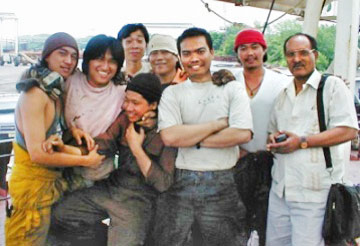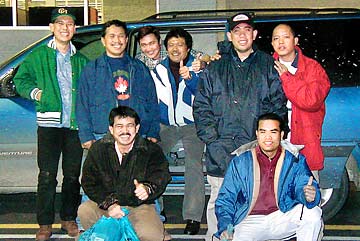Now the Priority is Shipboard Visits
Reflections on the Mission of SCI as I Begin My Tenure, July, 2013
by the Rev. Canon Dr. Peter B. Stube, SCI Executive Director
September 11, 2001 completely altered the way we do our mission. While our mission to be Good Samaritans for seafarers has not changed from the beginning, the way we work out that mission is very different.
For 170 years Seaman’s Church Institute has served seafarers and the port of Philadelphia and South Jersey. As the shipping industry has changed so has the way we do our mission. In the 1980s and 1990s ships stayed in port for weeks at a time. SCI arranged soccer tournaments between ships, a popular diversion for seafarers. These were arranged by the Rev. Neale Secor.
After 9/11 2001, Fr. Secor’s successor, the Rev. Jim Von Dreele responded to the pressing need of that decade. Seafarers were not allowed off ships at all in the years after 2001. Fr. Von Dreele worked with U.S. Senators, Coast Guard, Border Patrol, and other seafarer ministries to win back a limited right for seafarers to be granted leave for shopping and sightseeing if they had visas.
As a condition for shore access, seafarer missions throughout the U. S. agreed to provide transportation for seafarers from the piers to the various venues and back to the ships. From the beginning we deemed it necessary to provide this transportation at no cost to the seafarers. The maritime industry and ship owners have been generous in their giving to the various seafarer ministries which has enabled us to pay fuel and servicing for a fleet of vans. Many of our vans have been given to us through grants from ITF Seafarers’ Trust. Without their continued generosity we could not do this ministry.
Fewer than 25% of the seafarers are able to leave the ships in Philadelphia and South Jersey today. 9/11 shaped some of this reality. But the industry has changed. Container ships are only in ports for a few hours and the crew has responsibilities that require their attention thus precluding time away from ships. Therefore it is clear to us that our primary work can not only be transporting the 25% that we take from the ships. We must also spend substantial quality time with seafarers on board their ships sitting with seafarers at their breaks and mealtimes. Our ship visitors are skilled listeners and have been able to discern issues that need attention by one of the other agencies in the port.
As SCI has lived into this “sea change” in the maritime industry, we have responded quickly and prayerfully in response to our founding vision. The Old Testament prophet Micah said “He has told you, O mortal, what is good and what the Lord requires of you: to do justice, to love kindness, to walk humbly with your God.” This vision has been our mission from the beginning.
Generations of SCI chaplains and visitors have served the seafarers as “Samaritans of the sea.” We have sat with them on ships and listened to their stories and needs. We have provided a safe haven for them in this port. When issues of fairness or justice have been transgressed by owners or captains, SCI has worked in concert with various agencies and organizations to rectify the situations.
Because we see faithful seafarers from varied religious and ethnic backgrounds we have maintained a vision that we exist to serve needs with humility and hospitality. We preach the gospel by acts of kindness and justice and, if necessary, we use words. While we do not proselytize, we do offer the resources of prayer and sacraments to the seafarers. They choose whether to avail themselves of the faith-based resources we offer. If our actions open an avenue for conversations about faith we are more than willing to speak of the Holy One we love who motivates our mission. We invite, we do not proselytize.
Today our mission is less centered in our Seamen’s Center because seafarers are less able to come to us as in seasons past. Instead we are more agile and mobile. This summer we sold our building at 475 North Fifth Street and leased back a much smaller footprint in the same building at a fair price. We now require a much smaller footprint which reflects our more mobile ministry. This has enabled us to cut our overhead substantially, build our investments account, move out of the leasing business and focus even more intentionally on our seafarers and those who work the port. A major focus now is to build our volunteers so we may always care for the needs of seafarers who come to our port.
Since only 25% of our seafarer’s are able to come off their ships, we go to them. Last year we boarded over 90% of the almost 1500 ships that came into this port. Chaplains, ship visitors and other drivers of our vans went on board to sit and listen and respond to need.
We provided phone cards and Internet access so that seafarers could call home or video conference with their families back home. They are away from their families for 9-12 months of the year. In the past we provided banks of phones and computers in the center but this is no longer needed so we have moved on to this newer technology.
The chaplains and visitors are a remarkable group of people. Most have been serving for a long time (7, 10, 34 years) and see their work as a ministry to God’s children. They work with difficult situations and do so with grace and pastoral care. We have both paid and volunteer visitors who board the ships.
Seamen’s Church Institute is always a work in process. In faithfulness to the Holy One we show hospitality to the stranger, arrange whatever worship opportunities are needed by those who visit our shores, provide pastoral care to and work in partnership with those who serve the port, we strive for justice and work for fairness. We attempt always to be attentive to new occasions that require different activity that we may continue to be a mission through whom “justice rolls down like water and righteousness like the everlasting stream.”